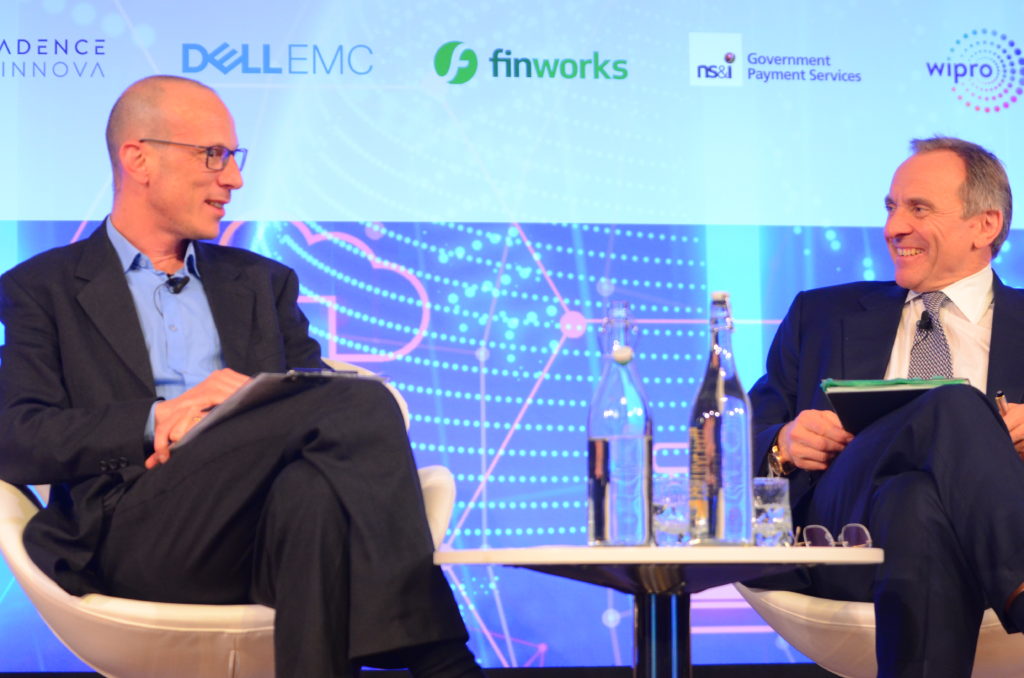Brexit demands pace and innovation, says John Manzoni


The UK civil service has never previously faced a challenge like Brexit. To meet that challenge, its chief executive John Manzoni argues, officials must take a very different approach to innovation, risk and decision-making. Ian Hall reports
The UK’s departure from the European Union must act as an “accelerator”
for innovation in Whitehall, according to the chief
executive of the UK civil service.
John Manzoni was speaking at the Innovation 2019 conference – hosted last week by Global Government Forum, in collaboration with the Cabinet Office. Asked by Global Government Forum editorial director Matt Ross whether Brexit is pushing the civil service to innovate, Manzoni replied that “it has to”.
“Never waste a good crisis – and this is a good crisis,” he continued. “The
question is: how do we make the civil service what we want it to be, instead of
what we are – and there are lots of dimensions to that.”
Pace of change
Manzoni was answering questions on stage at the closing session of the event,
which was held on 28 February in Westminster. With the UK formally due to leave
the EU on 29 March – although it is likely the date will slip – the civil
service lacks the time to deliver essential change projects using traditional
methodologies, he argued.
Many civil service projects go through a ‘Valley of Death’ period between
development and implementation. But Manzoni commented that “the interesting
thing about Brexit that is unusual in the policy space is that… we haven’t got a
year or two, we haven’t got any time to be in the Valley of Death. These things
have to be defined and implemented; as soon as 30 days from now, possibly.’
He said: “We have been banging on about how we get policy and implementation
joined up. With Brexit, we haven’t got any choice. That’s the organisational
innovation – it’s an accelerator.”
Making you stronger
Manzoni also argued that, after Brexit, the remit and breadth of civil
servants’ roles may be wider than it has for decades.
“The serious challenge for this government and this organisation, the civil
service, which really has its nose to the grindstone right now… is that at some
point we have to be at the other side of this and at some point we have to lift
people’s heads,” he said.
“There are really interesting opportunities. This is Britain in a different state, in a different world. How ambitious do we want to be in terms of orchestrating our economic policy, our agricultural policy or how we run a border? The world is our oyster; we can be as ambitious as we like, in a way that will bring all sorts of innovation.

Well-judged risks
To meet the challenges around Brexit, Manzoni argued, the civil service will
have to change its approach to risk.
“What you notice [in the civil service] is the general risk-aversion, and
it’s not anyone’s fault,” he said. “Select committees tend to put the civil
service onto the back-foot; they tend to make them feel defensive. There’s a
lot of what I’d call Monday-morning quarter-backing: ‘Why didn’t you do that? Why
didn’t you get that right?’ That whole thing puts our system into a risk-averse
culture which prevents people from taking managed risks and prevents people
innovating.
“What is the solution? I think it comes down to a cultural issue and comes
down to leadership, whether it’s that risk aversion or whether it’s the silo’d
nature in how we organise ourselves. I always say to people: ‘You can have a
nice life, and come to work every day, why would you want to step out [of line].
Or you can make a difference’.
“And the question then is: how do we invite people to step up to make a
difference, to be prepared to take a risk – and this comes down to leadership.
And leadership happens all the way down the system. So my own resolution to
this is to say to people at every level: how, in a tiny way, can you invite
your own teams to take control of their own destiny?”
Taking back control
The ability to assess risk correctly is, Manzoni argued, a learned skill –
and one that people must acquire within the civil service. “It’s okay to take a
risk,” he said. “But it’s no good taking an ill-judged risk, because you’ll be
wrong. This is a very fundamental issue. How do we put people in a position
where they can take well-judged risks? And that judgement comes, in my view,
from experience, not intellect. How do we build proper experience in our young
people so they can take well-judged risks?”
And the civil service chief exec argued that to become more innovative and
meet the challenges of Brexit to short deadlines, officials will have to be
given the license and support to make more decisions themselves – resisting the
temptation to constantly refer back to ministers and top officials for
permission to act.
“This system tends to look upwards, and that is a very, very dangerous place [to be],” he said. “That is the single most striking thing that I have noticed since coming into the public sector: the upwards focus of the system. ‘Would the minister like to do this, would the politicians like to do that?’
“It’s something that, in my world [of business], is called upwards
delegation, and you never do it. You certainly don’t have control of your
destiny if you’re waiting for an answer from someone else all the time. So the
question is: ‘How do we create a sense of controlled destiny at every level in
our system?’ This doesn’t happen overnight.”
Manzoni concluded the conference by saying: “It’s obvious what we [civil
servants worldwide] need to do: we need to get better at citizen-centric
services. The challenge is how we get it done.”
Innovation 2019 attracted 500 delegates from 39 countries to Westminster’s Central Hall. The sessions covered innovation in fields such as policymaking and procurement.
